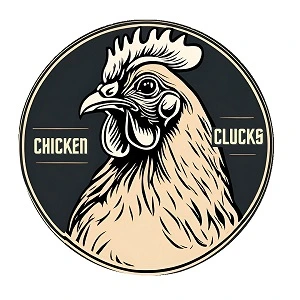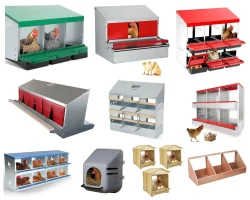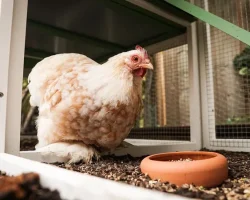As a chicken keeper, it is important to be proactive when the weather becomes too extreme because when the temperature starts climbing, the effects on your flock can become dangerous and even deadly. So, how do you keep your chickens cool in summer?
Understanding Heat Stress in Chickens
There are several ways to keep your chickens cool during the summer months. Let’s take a look at some practical and effective ways to do this.
How Chickens Regulate Body Temperature
Chickens use their respiratory system to regulate their body temperature. They do this by panting and spreading their wings in an attempt to release any excess heat. However, if they are not able to cool down properly, they can very quickly become overheated.
Signs and Symptoms of Heat Stress
It’s important to keep a close eye out for any of the signs and symptoms that could indicate that your chickens are overheating.
- Heavy Panting Or Open-Mouthed Breathing: Chickens regulate their temperature by breathing with open beaks and extending their necks to increase airflow.
- Lethargy Or Weakness: Normally active chickens that stand still for long periods, lie down more than usual, or appear unsteady on their feet may be suffering from heat stress.
- Holding Wings Away From The Body: Spreading their wings helps chickens release trapped body heat.
- Pale Or Discolored Combs And Wattles: Healthy chickens have bright red combs and wattles that aid in heat release. Heat stress and dehydration slow blood circulation, causing combs and wattles to turn pale or bluish.
- Low feed intake and high water intake: Like humans, chickens eat less in hot weather. While some reduction is normal, a drastic drop in feed intake is a sign of heat stress. Water intake typically is 2 times their feed intake but can increase to over 3 times during extreme heat!
- Reduced Egg Production: Heat stress can cause hens to lay fewer or smaller eggs. Prolonged exposure may stop egg production entirely.
- Diarrhea: Overheating can lead to diarrhea or wet droppings due to excessive water consumption affecting digestion.
- Droopy Posture, Confusion, Or Seizures: If a chicken appears disoriented, stumbles, or collapses, immediate cooling measures are needed to prevent heatstroke.
- Death or Mortality: If temperatures rise too high, chickens may struggle to regulate heat. Spreading their wings helps, but in extreme cases, their organs may shut down, leading to death.
It’s important to keep a close eye out for any signs and symptoms that could indicate your chickens are overheating.
Effective Chicken Coop and Run Ventilation
The best is to keep your chickens in a shaded, ventilated run during a hot day. At night, you do need to keep your chickens in their coop. You don’t want predators lurking around. Also, you probably want your hens to lay in the nesting boxes in the coop, instead of all over the run.
Click here to read our ultimate coop guide, and more about the best chicken runs.
A poorly ventilated coop, together with chickens who are generating excess body heat, can very quickly turn into an oven for your flock. This is why maintaining good airflow in your coop is one of the best ways to keep your chickens cool. The trick is to keep fresh air moving while allowing the hot air to escape.
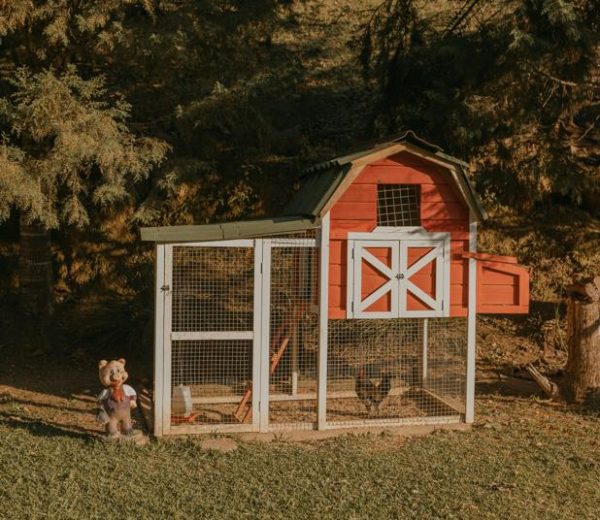
Designing for Optimal Airflow
There are many ways in which you can add some more airflow in your coop:
- Install Cross-Ventilation: Vents or openings should be put on opposite sides of the coop to prevent poor circulation and allow fresh air to come in and hot air to be pushed out.
- Use Windows And Open Spaces: Consider adding windows made of wire mesh or openings covered with predator-proof hardware cloth. This will help the hot air to escape and cool breezes to circulate to help keep your chickens cool.
- Raise The Coop Off The Ground: If it is possible, try to build your coop a few feet off the ground, especially if you live in warmer regions. This helps to improve the air circulation underneath the coop and keeps the floor cooler.
- Install Roof Vents Or Ridge Vents: Having a vent installed alongside the highest part of your coop will allow hot air to rise and escape keeping it cool and comfortable.
- Use Breathable Materials: When building or renovating your coop, you should use breathable materials such as open mesh. Try to refrain from using materials such as wood that can trap heat.
- Avoid Overcrowding: If you have too many chickens in your coop, there will be an increase in heat buildup. Always make sure that your coop has enough space to prevent too much body warmth and overheating.
Implementing Fans for Enhanced Cooling
In some cases, even if you have good ventilation in your coop, the days are simply too hot for your chickens to stay comfortable. Making use of a fan in your coop can help to lower humidity and improve air circulation.
Here’s what you need to know when using fans in your chicken coop:
- Why Use Fans? Stagnant and humid air can increase the instances of heat stress and respiratory issues in your flock. Fans help this air to move around, especially in enclosed spaces.
- Where To Place Fans? Think about where your chickens sleep and be mindful about where you place your fans. Fans in the chicken coop should not blow directly onto your chickens but rather keep the air in the coop moving. Only in extremely hot temperatures, blowing directly over the chickens might be necessary. Hanging a fan in the run, or setting one up right next to the run, allows the chickens to sit as close or far from it as they wish.
- How Will I Supply Fans With Energy? Fans come in models powered by electricity, batteries, and solar power. It is up to you what choice fits best. However, be mindful that if there is no sun during the night, the temperature may still be high. So, solar-powered fans should have s small battery to last throughout the night.
Safety Tips for Using Fans
- Always make sure that fans have protective covers to prevent dirt and debris from building up in the motor.
- Make sure that electrical cords are covered properly and out of reach of curious chickens who might want to peck at them.
- Fans must be mounted securely, preferably to the wall or roof.
- Putting floor fans in your chicken coop and run is a no-go! What if they fly in the fan or tip it over?!
- If you need to use an extension cord, it is important to use one that is suitable for outdoor use.
Best Fans for Chicken Coops and Runs
For the chicken coop, exhaust fans are often the best option. Preferably, mount them on the wall a little under the roof. They will pull got, stale air out and improve air circulation in the coop. Professional chicken farms also use similar fans, but much bigger.
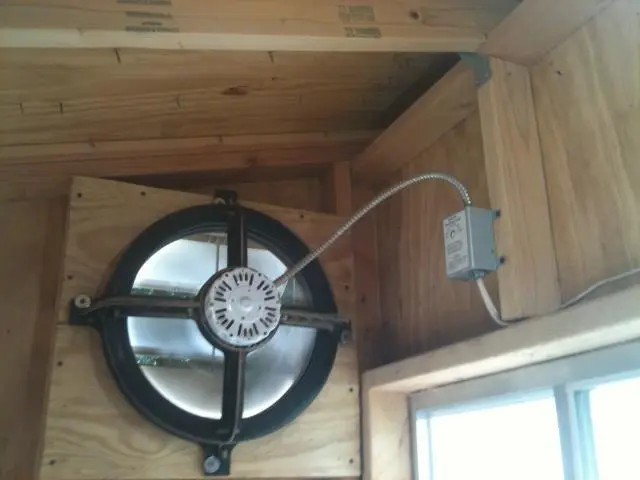
In the run, ceiling or wall-mounted circulation fans will be helpful. You can also put floor fans just outside the run, blowing in. Never set them up in the coop or run, as this can be a safety hazard!
There are a few more factors to take into account when choosing a fan. The fan should:
- Be weather-proof and dust-resistant
- Ideally, have an automatic thermostat
- Not make a lot of noise, your hens and you will love quiet models
- Be easy to clean to prevent dust buildup
- Have a cage around them to prevent birds from flying in
Providing Enough Shade
It is important to make sure that chickens have access to shade both in and around their run. When your flock is exposed to direct sunlight, their temperatures can rise to dangerous levels.
Natural Shading Solutions
It is relatively simple to use natural shading to help create a cooler and healthier environment for your flock.
Here are some natural shading options that can work very well:
- Plant trees or shrubs: Good for the environment and good for your chickens! Planting fast-growing trees around your coop can give you the benefit of long-term cooling. Bushes and shrubs can also help to cast a shadow onto the ground. But always make sure that these plants are non-toxic to your flock.
- Use climbing plants: If you don’t have enough space to plant trees, then using climbing vines can be a great alternative. Additionally, the added greenery can help with airflow and cool the area around it. However, first check if your plants are not toxic to chickens.
- Let nature do the work: If you live in an area with hills, boulders, or large landforms, then think about making use of their natural shading effects to cool down your chicken coops.
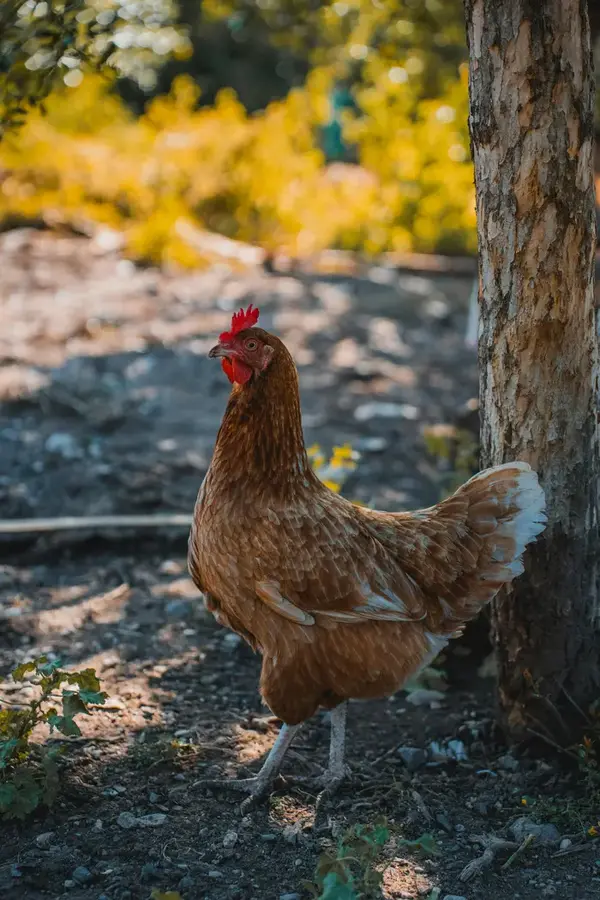
Artificial Shading Options
If natural shade isn’t an option, don’t worry! You can still give your flock enough shade with these easy and cost-effective solutions:
- Shade cloths or tarps: These are simple yet effective ways to block the sun and avoid overheating your chickens. Stretch them over your coop, run, or any other area that gets direct sunlight.
- Portable canopies or umbrellas: Canopies, umbrellas, and even patio covers can help to add shade to your coop and surrounding areas. This is a great option for those who live in open areas with no permanent shade structures.
- Corrugated roofing or bamboo mats: Corrugated metal or bamboo mats are sturdier than cloth or tarps and can be used to create a shaded area for your chickens.
Additional Cooling Techniques
Misters and Sprinklers
Water can cool your flock down, especially on days that are scorching hot. This can be done by using misters and sprinklers:
- Misting systems – The great thing about misting systems is that they can lower the temperature of your coop without seeping into the ground. Place misters in shaded areas for the best cooling effect.
- Gentle sprinklers – A light sprinkler system can help to reduce the heat in your coop tenfold. The only downside is that the ground may get muddy, and it can lead to bacterial growth or foot problems. Hence, I would recommend misting systems rather than sprinklers.
- Water on coop roofs – Simply spraying a little water onto the roof of your coop can help prevent the inside from getting too hot. Farmers in Africa do it al the time! Special roof sprinklers also exist, to save you the work. In hot weather, you might need to spray every hour or more to keep the roof wet.
Creating Dust Bath Areas
Chickens are instinctively driven to take dust baths. They do this to stay clean, get rid of parasites, and regulate their body temperature.
Here is how to set up the perfect dust bath area:
- Chickens are drawn to taking a dust bath in dry, loose dirt, so make sure that your dust bath area has plenty of it.
- Wood ash and sand are cooling materials, so it is a good idea to mix them into the sand.
- If you want to keep your flock cool, then why not put up a small roof cover over the dust bath area for extra shade.
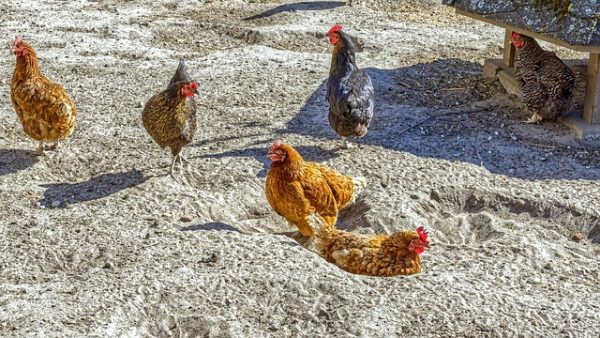
Ensuring Proper Hydration
Water is life for every living thing, this includes your chickens. A dehydrated chicken is a chicken in distress, and even just a few hours without water can put their health at risk.
Access to Fresh, Cool Water
Here’s how to keep your flock’s water fresh, cool, and easily accessible during the hot summer months:
- Make sure to change the water regularly, as water that stands in the sun for too long can become hot and less refreshing for your birds. Aim to change your flock’s water at least twice a day.
- Place your waterers in the shade to keep them cooler for longer. Try to set water stations up under a tree or a canopy.
- Using larger and more insulated waterers that will take more time to heat up and keep the water cooler for longer periods.
- Use multiple water stations. Dehydrated chickens do not feel like walking around looking for a waterer. Place waterers all around the coop to ensure that there is always a waterer within reach.
Chicken Hydration Tips
Keeping your chickens safe in extreme heat goes beyond just making sure they have access to water. Here are some ways in which to help them hydrate and replenish lost fluids:
- Add electrolytes to their water. You can use a simple homemade electrolyte mix consisting of water, salt, baking soda, and sugar to help restore your flock’s electrolytes. However, also good and more balanced electrolyte water supplements are available for purchase.
- Toss in a few ice cubes or a frozen water bottle to keep their water cooler and more refreshing.
- Spoil your chickens with hydrating treats. Foods such as cucumber, watermelon, frozen berries, lettuce, and zucchini have a high water content, plus your chickens will love them!
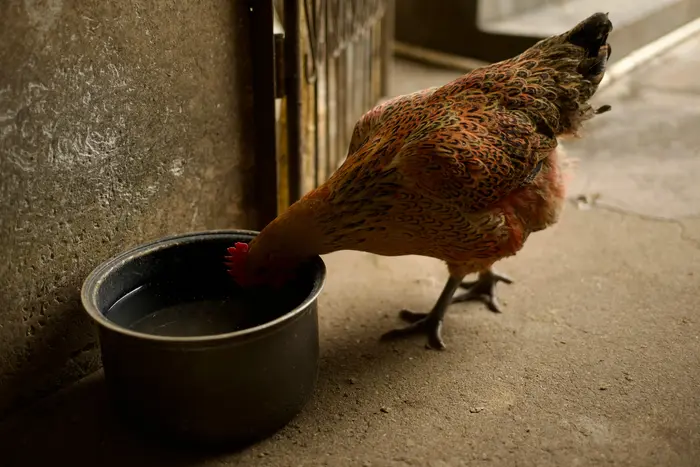
Home-made chicken electrolyte recipe for heat stress
You can use a simple homemade electrolyte mix in water, to help your chickens in hot periods during the summer. It will help to (re)hydrate your chickens to prevent heat stress, but also after illness or diarrhea.
Ingredients:
- 1 liter (4 cups) of warm water
- 1/2 teaspoon salt (sodium chloride)
- 1/2 teaspoon baking soda (sodium bicarbonate)
- 1 tablespoon sugar or honey (for energy)
- 1/4 teaspoon potassium chloride (optional, found as “NoSalt” in stores)
Instructions:
- Mix all ingredients in warm water until dissolved.
- Let it cool before giving it to the chickens.
- Offer it fresh for one day in a separate waterer from their regular water.
Do not give it daily! Only for a few days during extreme weather or illness.
Feeding Strategies During Hot Weather
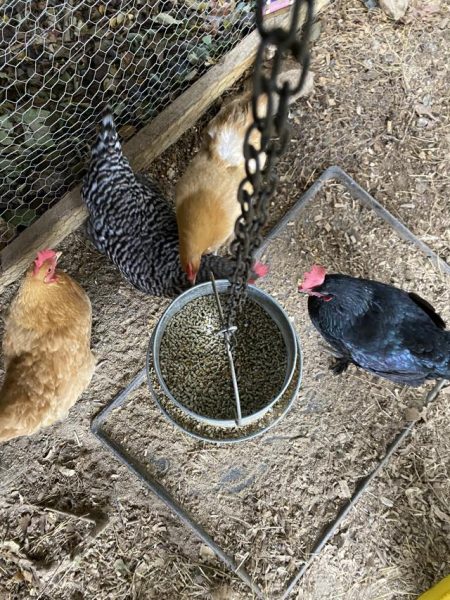
When your chickens digest their feed, they generate heat while their bodies break down the chicken feed. While this is great during winter, in the summer months, it might be advisable to tweak their feeding schedule slightly to stop any unnecessary heat from building up in their bodies.
Here’s how to adjust your chickens’ feeding routine for hot weather:
- Try to feed your chickens early in the morning or later in the evening when the weather is cooler. This will allow your flock to digest their feed without overheating.
- It is important to limit foods that are high in energy, such as proteins or carbohydrates, as these increase metabolic heat production in your birds. Rather, give them lighter and more hydrating foods.
- Always keep your flock’s food fresh and dry by storing it in a cool, dry place. Also, only give your flock what they can eat within a short period.
How To Choose The Best Chicken Feed For Healthy Hens? Click to read more.
Many feed supplements are available on the market to alleviate the effects of heat stress. However, as a chicken nutritionist, I do NOT recommend feed supplements for heat stress! Why not? Because it is much better to add supplements to the drinking water. In heat stress, your chickens often eat less and drink more! Also, water supplements are easier to give, while powders to sprinkle on the feed can end up at the bottom of your feeder.
Selecting Heat-Tolerant Chicken Breeds
Different chicken breeds adapt better to certain temperatures, and choosing the right chicken breed can make a massive difference in how well your flock can handle the heat. This is because certain chickens are more heat-tolerant due to their body structure and activity levels.
Characteristics of Heat-Resistant Breeds
It is vital to look for breeds that have the following characteristics:
- Large combs and wattles – Chickens that have large combs and wattles are better able to release excess body heat. This is because they help with heat dissipation
- Lightweight bodies – Lighter breeds tend to be more active and stay cooler, while heavier breeds tend to retain the heat more.
- Loose or sparse feathering – Breeds that have a lot of feathers battle to regulate their bodies in hot weather. Look for breeds that have fewer or looser feathers.
- Active and foraging nature – Busy chickens usually look for shade and cooler spots more than those that don’t move around as much.
Top Heat-Tolerant Breeds
If you are looking for chickens that fare better in hot weather, then these are the breeds to look for:
- Leghorns are wonderful foragers and also have large combs that help them to keep cool.
- Turkens (Naked Necks) are a great choice for hot climates as they have fewer feathers, which helps them to stay cooler.
- Anconas are an active, lightweight, and heat-resistant breed. Perfect for warmer climates.
- Egyptian Fayoumis are heat-tolerant and specifically bred for hotter climates.
- Easter Eggers are very adaptable to changing weather patterns, which makes them a good choice for varied climates.
- Minorcas don’t have many feathers and are also suitable for hot climates due to their large combs.
- Catalanas are Spanish-bred birds that have sleek bodies and are extremely heat-resistant.
Always remember that if you already have a flock, then you can gradually introduce other heat-tolerant breeds to improve their overall heat resilience.
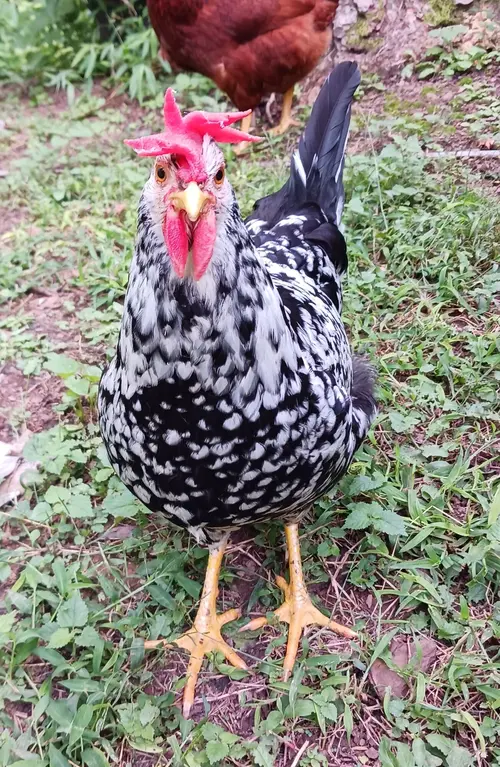
FAQ: How to keep chickens cool in summer
Can I spray my chickens with water to help them stay cool?
This is entirely up to you, but if you decide to, then proceed with caution. Most chickens won’t mind a little misting, but others may panic. Avoid fully soaking your chickens, as wet feathers can become heavy and make it even harder for them to regulate their body temperature.
How can I encourage my chickens to drink more water during hot days?
Chickens don’t like to drink warm water, and I don’t blame them. Always make sure that their water is fresh, cool, and in a shaded area. You can also add some ice cubes to their water to encourage them to drink more.
Are there specific coop designs that help keep chickens cool?
Yes, there are plenty of coops that have been designed specifically for warmer weather. They are equipped with windows, vents, and fans to promote the flow of air and keep your chickens cool.
What should I do if one of my chickens is suffering from severe heat stress?
Immediately take your chicken to a cool and shaded area. Use a damp cloth to cool their body, place them in front of a fan, and offer them some cool water with electrolytes. If your chicken does not start to show improvement quickly, then consult with your veterinarian.
Is it effective and safe to use misters in humid climates?
Misters are a wonderful way to cool down your chicken coop, but when it comes to humid climates, they might increase moisture levels and dampen the coop. Also, because there already is a lot of moisture in the air, they will be less effective in cooling. Rather stick to fans.
Final Thoughts
So that is how to keep your chickens cool during summer. If you make sure that you are prepared for the hot summer months, keeping your chickens cool should not be such a daunting task. Always remember that a healthy chicken is one that is not dehydrated and hot. Most importantly, always watch for signs of heat stress in your flock and act immediately before it is too late.
